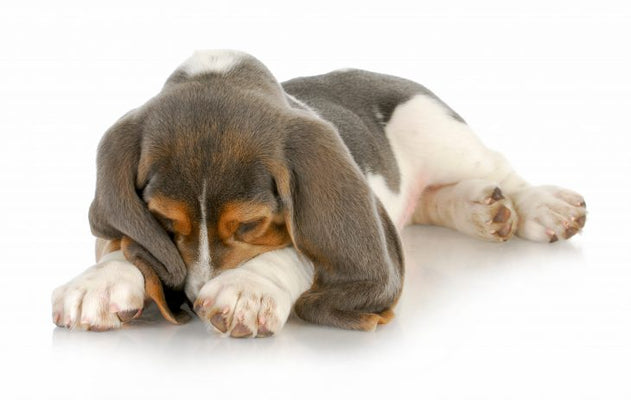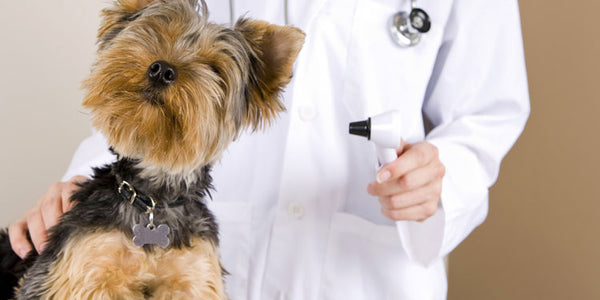What causes dog odours? Most dog owners today love cuddling their pets, your dog probably roam freely in the house and enjoys car rides when going out for an dog based activity. However, If your dog has an bad odour, it would be rather difficult or unpleasant to carry out the above mentioned activities.
Basically, all animals (including human beings) have their distinctive scent. With this being the case, your dog will always have their own distinctive odour, even if you wash and groom him/her on a weekly basis.
You might not notice the smell yourself when you are used to living with a dog and have grown accustomed to your dog natural scent.
Dogs are known to love smelling bad, hence tend to roll in relish mud, muck or even in smelly water.
Some dog breeds are known to have a stronger natural scent than others because of waxier ears and greasier skins when compared to other dog breeds. Although this might be the case, you can mask and reduce this natural scent by cleaning and grooming your dog regularly.
Your dog’s natural dog scent – as bad as it may be- is usually not a cause for alarm. Dog odours may be caused by varying factors and being able to distinguish the different odours could prove useful when trying to ascertain if your dog is feeling unwell.In this this article, we will help you understand the various causes of your dog’s odours and find out how to resolve this problem.
Dog Odours – What causes it?
According to the leading animal ophthalmologists today, it is not advisable to ignore bad smells coming from your dog. Detecting abnormal smell on your dog is not that difficult; you can actually tell when your dog needs a bath and when it has a bad breath. Abnormal smells on dogs tend to be normally stronger and unbearable. Dog odours may be caused by an array of things:
- Medical Complications – The bad smell emanating from your dog may actually be a symptom of an underlying health condition. Some of the health conditions that may cause a change in your dog’s odour include diabetes and kidney failure. In such a case, it is advisable to have the dog diagnosed and treated by a qualified veterinary doctor (vet).
- Bad Breath – This is often referred to as Dog Halitosis and may as a result of constipation, indigestion, or even dental health problems, such as gingivitis in your dog. Since healthy dogs that have their teeth brushed regularly are supposed to have a relatively fresher breath, bad breath could mean that something is wrong with your dog.
- Flatulence – In some cases, the odour could be coming from the rear end of the dog. Just as is the case with any other animal, the gas released in dog flatulence has a foul smell. But constant flatulence could be an early sign of underlying medical problems that may be caused by allergies, constipation, poor diet or eating too fast. If this continues for some time, you should take the dog to a vet for check-up.
- Ear Infections – Ear infections are often the result of smelly dog ears. For instance, bacterial infection in the ears leads to the production of a smelly discharge from the ears. To prevent this problem, you should regularly inspect and clean your dog’s ears of debris, dirt, mites to prevent possible infections.

- Problems in the Anal Glands/Sacs – Certain anal gland problems, such as abscess and impacted anal glands are rather common among dogs today. if this is the problem, you will detect a strong and distinct dog odour emanating from the rear end of your dog. Another common symptom of anal gland problems is the dog scooting on the ground regularly.
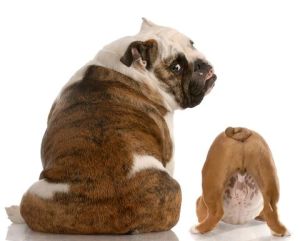
- Skin Infections – Certain skin infections in dogs are also known to produce a foul smell (Dog body odour!). While skin infections will manifest in several other symptoms, the foul smell is often the first symptom. A dog that suffers from an allergic condition and has a skin infection, for example, will produce a unique, rather sweet, yet offensive smell. This is because the oils on the dog’s skin are being affected by bacterial activity.
- Yeast Infections – Yeast infection is a comparatively common problem in dogs today. In some cases, this infection can lead to other problems, in addition to the musty, pungent odour it produces. If your dog has musty-smelling ears or stinky paws, it probably has a yeast infection.
- External Causes – in some cases, the cause of bad smell on dogs is simple. For instance, the dog may be smelly because it rolled in something smelly or has been sprayed by a skunk. If it is a skunk spray that is causing the smell, you should apply skunk spray on the dog’s fur to neutralise the skunk spray before it is absorbed into the dog’s coat. Otherwise, proper cleaning, hygiene and grooming should get rid of odours caused by such external factors.
As you can see, bad smell on a dog may be as result of different things. However, it is not advisable to ignore odours on your dog as they may be symptoms of more serious problems. So, how do you ascertain what is really causing the foul smell in your dog?
How to Distinguish Dog Odours
Just as there are many causes for dog odours, the resultant odours are also varied. Depending on the type of odour produced by your dog, you can actually determine the cause. So, do you know what the foul smell on your pet means? Here are some common dog odours and what they mean:
- Ketones – These are molecules that are formed after fat is oxidised in the body to produce energy. In most cases, this happens when the dog has unmanaged or even undiagnosed diabetes because the body does not have enough insulin to assimilate glucose. The accumulation of ketones in the body makes the dog’s blood more acidic (Ketoacidosis). This will, in turn, cause the dog to have a sickly sweet breath. If you are detecting a sweet sticky scent from the dog’s breath, it is probably suffering from Ketoacidosis and needs immediate medical attention.
- Yeast – If your dog smells like moldy bread, the yeast on its skin has probably overgrown. This problem is mostly characterised by smelly ears and stinky paws. Basically, yeast infection on the skin of your dog will produce a musty odour. This is often accompanied by itching, which makes the dog scratch its body and ears regularly.
- E.coli – This is a family of bacteria that is commonly associated with food poisoning in humans. While most of the E.coli bacteria are harmless, some may lead to infections along the urinary tract. If your dog is suffering from a urinary tract infection (UTI), it will produce cloudy urine with a characteristic foul smell. Other symptoms to watch out for include increased water intake and increased frequency of urination.
- Severe Halitosis – Based on research findings by the American Veterinary Dental Society, about 80 percent of pets are likely to develop periodontal disease by the time they are 3 years old. Even with proper and frequent brushing, your dog may develop dental problems. When this happens, your dog will have a foul smelling breath.
- Pseudomonas – This is a bacteria family that is known to resist several antibiotics today. As such, pseudomonas is comparatively difficult to treat. In dogs, these bacteria can infect the urinary tract. However, Pseudomonas commonly occurs in dog ears. Once in the dog’s ears, the bacteria cause the ears to secrete a pungent smelling, thick discharge. Along with the purulent discharge with a terrible smell, such an infection also has several other symptoms, such as crusting, bleeding and swelling.
- Fishy/Coppery Anal Glands – Anal glands are situated near the rectal opening. These scent glands normally produce a liquid that has a characteristic rotten fish smell. This smell may also be compared to that of copper coins. If you are detecting such an odour, you should net get worried because it is normal. However, a dog that licks, chews the area more frequently or scoots more frequently may have a problem in these glands.
- Viral Diarrhoea – Diarrhoea in dogs is among the common dog disorders today and may be caused by a myriad of things. Though rare, certain virus like the parvovirus can cause a severe, often blood stained diarrhoea in your dog. Such diarrhoea is associated with a terrible odour. Like many dog owners today, you may be unable to tell the smell of viral diarrhoea from that of normal diarrhoea. As such, you need to schedule an appointment with a vet the moment you notice something abnormal about a diarrhoea infection on your dog.
Understanding what the various dog odours mean makes it easier for you to ascertain their cause. By so doing, you will be in a better position to treat the cause and prevent it from reoccurring in future.
Recommended Solutions for Dog Odours
There are several types of dog odours, each of which has a different causal agent. Therefore, you should not expect one treatment remedy to work on all types of odours. Do note that the solution that works for one dog may not work for the another.
To counter the bad smell coming from your dog, you first need to know what is the cause of the odour. The various dog odour treatment methods and remedies are meant to target the root cause of the problem. Therefore, the various treatment products and methods may be categorised according to their target areas.
1) Treatment for Mouth Odours
The strong offensive odour present in a dog’s breath is referred to as Halitosis. Halitosis may be caused by several things including cavities, bacterial plaque and periodontal disease.
Basically, the brachycephalic breeds and the comparatively smaller dog breeds, such as the Pekingese, Boston Terrier and Pug, are more susceptible to periodontal disease. This may be attributed to the fact that their teeth are too close to each other. As compared to other dog breeds, these breeds are more likely to develop Halitosis, hence have bad breath. So, how can you get rid of mouth odours in your dog?
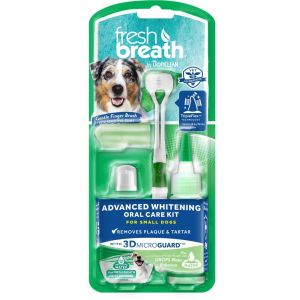
Currently, there are numerous products that may be used to treat halitosis and clear bad breath in dogs. You need to be very careful when choosing the best oral care product to treat mouth odours in your dog. One of the most effective and safe products, in this regard, is the Tropiclean Fresh Breath Advanced Whitening Oral Care Kit. The kit comprises of a brushing gel that features 3DMicroGuard, a TripleFlex Toothbrush and Gentle Finger Brush. This product comprises of powerful ingredients that will ensure that your dog has a fresh breath for up to 12 hours after brushing.
2) Treatment for Skin Problems
Under normal circumstances, your dog’s skin should not stink and or itch. If your dog’s skin is producing a stench and the dog is constantly scratching its skin, he/she could be suffering from an infection.
Skin infection in dogs is commonly caused by yeast. When this happens, the skin is not only smelly; it is also itchy and greasy to the touch. The best remedy for this problem is to wash your dog’s fur with a shampoo that targets the infectious organisms and kills them. For instance, the Dermcare Malaseb medicated shampoo is widely renowned for its effectiveness in treating this problem.
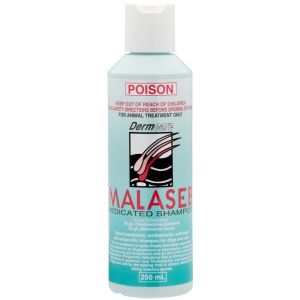
This shampoo functions by killing the microorganisms infecting your dog’s skin, lowering their numbers to manageable levels, gets rid of allergens that may be on your dogs skin and removes the excess oils and scales(dry skin flakes) that formed as a result of the infection. This way, you will get rid of the skin odour and also improve the appearance of your dog’s coat.
3) Treatment for Ear Odour in Dogs
Ear infections and irritation is one of the common dog disorders today. As a matter of fact, about 20 percent of the dog population suffer from repeated ear problems. If your dog’s ears are infected by parasites, one of the early symptoms is the smelly discharge that comes from the ears that is often accompanied by scratching, redness and swelling in the ears.

If this describes the the problem your dog is facing, you should use such products as the Dr. Golds Ear Therapy to clean the ears. This ear cleaning solution features antibacterial and antifungal properties which helps get rid of the infectious organisms from your dog’s ears hence clear the bad smell. It proves most effective when used weekly during bath times.
4) Treatment for Flatulence Dog Odour
Flatulence is the formation and accumulation of gases in the stomach. When this happens, your dog will fart thus producing a foul smell. Flatulence is commonly associated with digestion problems, such as constipation and indigestion. This being the case, addressing the digestive problem causing the flatulence in your dog can actually get rid of the associated odour.
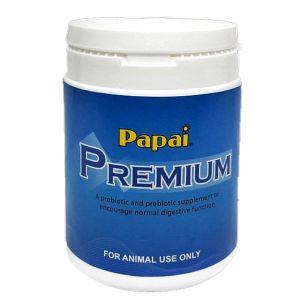
One of the best ways to treat this problem is to give the dog right supplements. One of the supplements you should consider using to treat flatulence is the Papai Premium Probiotic & Prebiotic plus Yeast Pet Digestive Supplement.
The supplement is renowned for its effectiveness in restoring normal digestion as well as improving the efficiency of digestion in dogs. Additionally, this product will also counter degeneration of your dog’s digestive system caused by ageing ands enhance your dog’s immunity.
Conclusion
To many dog lovers, dog odours are a nightmare because they would like to spend their time with their pets. Such odours are irritating and will make you avoid close contact with your adorable pet. However, this problem is easy to resolve so long as you know what is causing the odour in your dog. This article will help you treat dog odours, hence develop a stronger bond between you and your dog.
